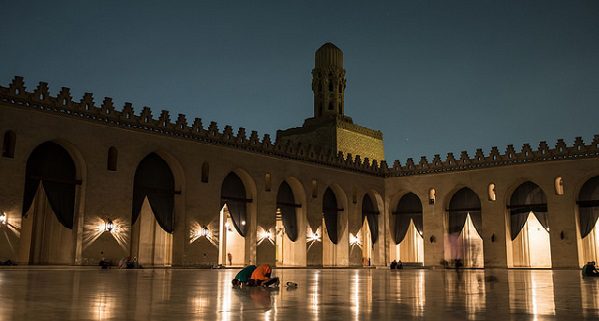
This is Day 28 of Altmuslim’s #30Days30Writers series for Ramadan 2015.
By Abdullah bin Hamid Ali
The Islamic historical and exegetical literature inform us that Ramadan gets its name from the fact that the very first Ramadan occurred during an intensely hot season. In the word “Ramadan” is “Ramda,” which means “severe heat” or the “sunbaked ground.”
Though it would be nearly impossible to ascertain with which particular month of the Gregorian calendar the first Ramadan coincided (since this was long before the Prophet Muhammad (peace be upon him) received the divine message), that the holy month this year fell in the summer during its long days and short nights makes one imagine what it might have been like for any pious people observing the fast long ago.
Heat is a particular challenge for fasters, especially for those with occupations which demand great physical exertion. The Quran 2:185 tells us that, “God wants ease for you, not hardship.” But it also tells us that “He wants you to complete the prescribed period” of the fast. In other words, to reiterate verse 2:184 before it, “For those who can fast only with extreme difficulty, there is a way to compensate — feeding a needy person.” That notwithstanding, “fasting is” still “better for you if you only knew.”
Fasting is better for more than the simple health benefits that accrue to fasters. To limit the benefits of fasting to the material benefits is to strip fasting of its spiritual facets. Like all other acts of Islamic worship, one of the ultimate goals of rituals is to inculcate moral virtue. The prayer, performed with the correct understanding and awareness, contributes to deeper humility.
Charity contributes to a number of virtues, like altruism, generosity and empathy with the poor. Fasting contributes to patience, self-control and endurance. The hajj is a consummate worship combining all the aforementioned virtues.
As for fasting, its rules say to us in its unique language that, “If one has the strength to abandon the things your body needs (food, drink and sexual gratification), one also has the strength to abandon the things the body does not need (lying, character defamation, theft, illicit intercourse, etc.).”
Speaking of the goals of worship in this fashion is not meant to imply that when people find themselves sufficiently infused with the moral virtues that they can abandon the foundational Islamic rituals. On the contrary, the point is merely that legalism can lead one to see only “material” benefits in rituals, rather than the higher spiritual benefits.
The Prophet Muhammad actually said, “Whoever does not forsake indecent talk and inappropriate acts, Allah has no need in them forsaking their food and drink” (Bukhari). Another thing he said was, “Many people fast and get nothing from it except for hunger. (Musnad of ‘Abd Allah b. al-Mubarak)”
In another hadith, he said, “Whenever one of you is fasting during the day, let him not speak or act in a vulgar manner. And if anyone reviles or tries to fight him, let him say: I am fasting. I am fasting. (Bukhari)” And he said of those unable to find the means to marry, “Whoever is not able, then let him fast. For verily it is castration for him. (Bukhari & Muslim)”
In other words, fasting is not merely a physical act. It is something meant to bring the believers closer to their Lord and to help them achieve mastery over their appetites: sensitive and rational.
This over simplistic understanding of the Islamic law, I would argue, is what led certain Muslims in the United Kingdom this year to suggest that Ramadan should be forgone in light of the extremely short nights and long days which might make fasting a major challenge. I was, personally, glad to see scholars there challenge this suggestion, which would fundamentally constitute a sort of abrogation or abolition of the fast of Ramadan for all British Muslims.
Because fasting is just as good, if not more, “spiritually” than it is “physically” makes it a particular spiritual practice indispensable to human flourishing.
This is an especially important concept to grasp when reflecting on attempts to redefine marriage and legitimize homosexual intercourse and relationships in all forms. The Muslims involved with this effort have fundamentally forgotten that Islam means “submission to the will of Allah,” not merely “peace” as has become commonplace today.
Can one honestly consider him/herself a true Muslim while attempting to make the divine commandments and moral code of Islam conform to their lusts, desires, and whims? This is categorically condemned in the Quran, and is often portrayed as a sign of a perverse heart. Even the idolaters of Mecca during the life of the Prophet — peace and blessing upon him — asked him:
Bring [us] a different Qur’an, or change it.” He responded, “It is not for me to change it of my own accord; I only follow what is revealed to me, for I fear the torment of an awesome Day, if I were to disobey my Lord. (10:15)”
Fasting reminds us that however difficult it may be to fulfill the commandments of our Creator, there is immense reward to be obtained from enduring the hardship produced by the suppression of our appetites, natural or otherwise. Neither the heat nor the fear of hunger nor of thirst of Ramadan interfered with the achievement of victory during the Meccan conquest.
Even the first decisive battle of Badr occurred during the month of Ramadan. The spiritual discipline of Muslims they learned through fasting and the blessedness of the holy month both contributed to their worldly success.
We will have to decide with the wholeness of our being if we desire spiritual openings or merely worldly status.
Abdullah bin Hamid Ali teaches Islamic law, jurisprudential principles and the prophetic tradition at Zaytuna College in Berkeley, CA (2007-present). He holds a collegiate license (ijaza ‘ulya) in Islamic law (Shari’a) from the Al-Qarawiyin University of Fes, Morocco, an MA in Ethics & Social Theory from the Graduate Theological Union and is pursuing a PhD in Cultural & Historical Studies in Religion at GTU. He has served as adjunct professor of Arabic Language at UC Berkeley and adjunct professor of Intro to Islam at the Graduate Theological Union. His current study interests are racial identity construction and “black” North African reactions to anti-black legal and theological teachings in the Maliki and other schools of Islamic law. You can find more of his writing here.











